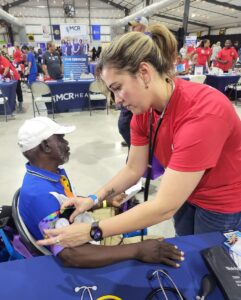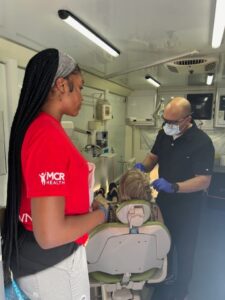Outlook uncertain for 100,000 low-income patients who rely on this struggling non-profit.
By Johannes Werner
Original Air Date: July 4, 2025
Host: Last fall, MCR Health declared Chapter 11 bankruptcy, entering a lengthy restructuring process that includes job cuts. More than 100,000 low-income and under-insured patients depend on the Manatee County-based non-profit for basic healthcare services. But MCR’s bankruptcy restructuring was made more complicated by two political developments this week. We have the details.

MCR Health in North Sarasota.
Johannes Werner: For one, Ron DeSantis wielded his line-item veto axe on an MCR request for state funding. Included in the governor’s veto on $600 million spending proposed by the legislature was $82,000 for “Manatee County Rural Health Services.” While the amount is small even for MCR and a tiny speck in the state big budget picture, it had been a recurring grant. Bottom line: The governor’s veto adds one more signal of financial uncertainty to the already troubled non-profit.
But—most importantly—on Fourth of July, Donald Trump was expected to sign a big budget reconciliation bill. The Trump budget includes $863 billion in cuts to Medicaid, the insurance program for more than 70 million low-income people in the United States. It also adds work requirements for adult-age Medicaid patients as well as citizenship checks. And that means shrinking enrollment. The Congressional Budget Office estimates that the bill will cause close to 11 million people to become uninsured. In Florida, according to one estimate, an additional 1.4 million low-income people will now have to pay out of pocket for medical expenses.
 And this kind of dropping Medicaid enrollment will affect the bottom line of MCR Health. The non-profit depends on Medicaid reimbursement for a big chunk of its income.
And this kind of dropping Medicaid enrollment will affect the bottom line of MCR Health. The non-profit depends on Medicaid reimbursement for a big chunk of its income.
The Commonwealth Fund expects 12,900 healthcare related jobs in Florida to fall by the wayside as a result of the “Big Beautiful Bill.” Will that include nurses and doctors in Manatee County clinics?
We tried to reach out to MCR. Calls and emails were not returned by deadline. A public relations company hired by MCR early this year said it was not working for MCR anymore.
Rachel Nuzum is a senior vice president policy at the Commonwealth Fund, an advocacy group for improved healthcare to low-income Americans. In an interview with WSLR News in May, she said she was unable to comment on the specific case of MCR Health. But she did say that organizations like MCR will face tough times.
 Rachel Nuzum: Any organization that relies on Medicaid and is serving a safety net population would feel the consequences—very real consequences—if cuts of this magnitude go forward. The counties in the areas with higher rural populations are areas where we know we already have health professional shortages. We already have workforce issues there. We already have capacity issues with rural hospitals closing.Rural hospitals are highly dependent on Medicaid as a payer. Those areas also really rely on their community health centers, and Medicaid is a major payer for community health centers. The very parts of the system that are on fragile ground right now—the rural hospitals, the ability to find someone who can deliver a baby in a rural area, the ability to get behavioral health care or mental health care or addiction services in rural communities—those are the places that rely disproportionately on Medicaid. Our expectation is that the cost would be felt even more severely in those areas.
Rachel Nuzum: Any organization that relies on Medicaid and is serving a safety net population would feel the consequences—very real consequences—if cuts of this magnitude go forward. The counties in the areas with higher rural populations are areas where we know we already have health professional shortages. We already have workforce issues there. We already have capacity issues with rural hospitals closing.Rural hospitals are highly dependent on Medicaid as a payer. Those areas also really rely on their community health centers, and Medicaid is a major payer for community health centers. The very parts of the system that are on fragile ground right now—the rural hospitals, the ability to find someone who can deliver a baby in a rural area, the ability to get behavioral health care or mental health care or addiction services in rural communities—those are the places that rely disproportionately on Medicaid. Our expectation is that the cost would be felt even more severely in those areas.
In 2023, Florida received $23 billion in federal support for Medicaid. 65% of all Medicaid spending in the state was covered by the federal government. Those dollars coming in support—like I just mentioned—the community health centers, the rural hospitals. When those resources get reduced, systems—hospitals, health centers—they have to meet their bottom line, so they reduce staff. There’s not a lot they can do to control how many people are coming in for services, but where they have the control is on the staffing. So the systems will be looking to reduce their expenditures. And then what we know is that, once people are losing their jobs, they’re spending less. When they spend less, that’s generating less for the state in terms of state and local tax revenue. It’s really a cascade effect.
 JW: Earlier this year, MCR Health provided us with this statement:
JW: Earlier this year, MCR Health provided us with this statement:
“In order for MCR Health to remain a leader in providing healthcare and access for all, we made some difficult operational decisions to align with our financial reality. These decisions included workforce reductions and filing for Chapter 11 in early November, 2024. Several reasons behind these decisions included two very aggressive hurricanes, the end of COVID funding, high-inflation, and unforeseen guidance from the Health Resources and Services Administration. We remain a trusted partner in our community and are steadfast in our commitment to meet the needs of our patients.”
Reporting for WSLR News, Johannes Werner.
WSLR News aims to keep the local community informed with our 1/2 hour local news show, quarterly newspaper and social media feeds. The local news broadcast airs on Wednesdays and Fridays at 6pm.